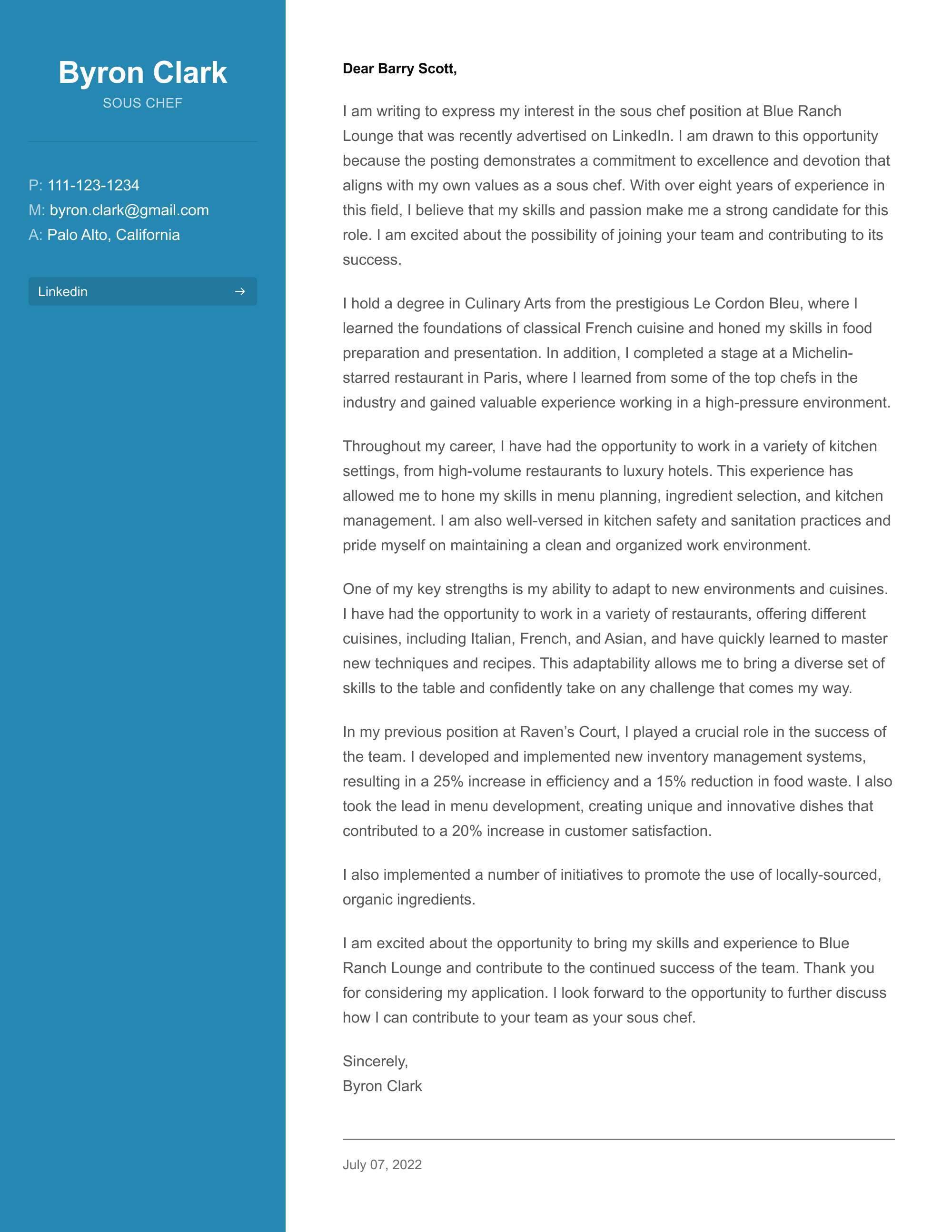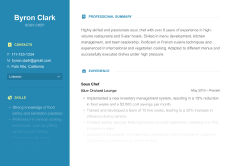Are you a culinary master looking to take the next step in your career? As a sous chef, you'll have the opportunity to work alongside the executive chef, leading a team and creating delicious dishes for restaurant patrons.
But before you can start chopping and sautéing, you'll need to convince the hiring manager that you're the right fit for the job.
Indeed, you have to write an impressive resume to get the recruiter's attention. That said, they may also want to find out more about you by looking at your cover letter.
That's why a well-crafted sous chef cover letter can make all the difference.
In this article, we'll show you how to prepare a cover letter that will make your application stand out from the competition and land you that coveted sous chef position.
Do You Need a Cover Letter?
Most career advisers claim the cover letter is slowly losing its place in the hiring process. While you may not need a cover letter if you have a strong referral, some recruiters still place a great deal of importance on it.
A cover letter can give a sous chef applicant an edge as it provides a personal and professional introduction to the employer.
By highlighting your relevant skills, experiences, and qualifications, you're able to be more than a stat in the hiring process and show the recruiter who you are.
You'll not just be showcasing your skills but will also show who you are as the cover letter gives you an opportunity to share your story.
Advantages of Including a Cover Letter in Your Sous Chef Resume
A cover letter is an opportunity to demonstrate your writing skills and to show the employer that you are a good fit for the position.
There are several advantages to including a cover letter alongside your sous chef resume:
- It allows you to personalize your application and make it stand out from the competition.
- It gives you the opportunity to explain your qualifications and relevant experience in more detail than what is listed on your
sous chef resume .
- It allows you to highlight your skills and achievements that are most relevant to the position.
- It gives you the opportunity to provide specific examples of how you have excelled in previous culinary roles.
- It allows you to express your enthusiasm and passion for the role and the company.
Overall, a cover letter can help you make a strong case for why you are the best candidate for the sous chef position and can help you get noticed by the employer.
Helpful Tips on Writing Your Sous Chef Resume
There's a story behind every application. So, when a recruiter decides to read your cover letter, it means they're impressed with your resume and are now interested in your story.
Your cover letter is your chance to tell your story and show the recruitment manager that you're more than just a few bullet points.
From the address and salutation to the closing remarks, you have to personalize your application.
Before you get started, here are some tips to keep at the back of your mind when writing the cover letter:
The Employer Should be the Main Focus
Your primary objective should be to persuade the manager that you are the best fit for the position. However, be mindful not to include too many personal anecdotes in your application.
Instead, review the job description and highlight the information that you believe will be most relevant and appealing to the recruiter. Focus on demonstrating how your skills and experience align with the requirements and goals of the role.
Let Your Personality Shine through the Letter
In your cover letter, you have the opportunity to demonstrate to the employer that you possess the personal qualities they are seeking. This is a chance to showcase your enthusiasm for the opportunity to work with the company and highlight how their work culture aligns with your work style.
By doing so, you can convince the recruiter that you will be able to smoothly integrate into the company once you begin working there.
You can also provide specific examples from your previous job showing how your interpersonal skills helped you achieve successful results.
Tailor the Cover Letter to the Open Position
Use keywords from the job listing to guide your selection of examples and highlight your relevant achievements.
For instance, if the employer is seeking an experienced sous chef with knowledge of specific cuisines, you should mention how you used those cuisines in your previous or current position. You can also provide evidence of your efficiency or client satisfaction rate to show that you are capable of delivering.
Keep in mind that space is limited, so it is important to avoid adding unnecessary information.
Mirror the Recruiter’s Tone
Pay attention to the language and words used in the job posting to get a sense of the employer’s attitude and perspective.
If they seem enthusiastic about hiring new sous chefs, ensure your cover letter also conveys your excitement.
Additionally, many firms include information about their team values and company culture in the job description. Use your cover letter to demonstrate how you align with these values and express your interest in learning more about and becoming a part of the company’s culture.
Use Direct Language
The way you phrase your experiences can have a big impact on how they are perceived.
Use strong, active language and action verbs to convey your accomplishments and responsibilities.
For example, rather than saying "I was responsible for reducing kitchen waste," try "I successfully reduced food waste by 30%." This not only sounds more confident and assertive, but it also clearly demonstrates the scope of your work and the results you achieved.
Use Metrics and Real Life Examples
Instead of just saying that you did something, provide the recruiter with specific numbers and metrics to illustrate the results you achieved.
Avoid cliches like "I'm great at inventory management." Instead, give concrete examples of your skills and achievements, such as "I introduced an inventory management system that increased efficiency by 35%."
The numbers will give the recruiter a clearer picture of your capabilities and help them understand the impact you had in your previous position.
Step-by-step Guide on Writing Your Sous Chef Cover Letter
Follow these guides when writing the different sections of the cover letter.
The header is where you have your name, contact information, and date.
Here are a number of things to note about your header:
- Don’t add your mailing or house address unless the recruiter specifically asks for it.
- Don’t use your current work email.
- Your email address should ideally be made up of your first and last names, not nicknames or ideas.
Make sure the details you add to your cover letter don't contradict what's on your resume. Go over your resume and cover letter once you're done to make sure they agree and align.
How To Address the Hiring Manager
It is always best to address the hiring manager by name if you are able to find their name.
If you cannot find the name of the hiring manager, you can use a generic salutation such as "Dear Hiring Manager," or "Dear Recruitment Team."
Here are some tips for addressing the hiring manager in a cover letter:
- Do your research: try to find the name of the hiring manager by looking at the job posting or the company website. You can also go through LinkedIn to find out the name of the business's head of recruitment.
- If you cannot find a name, try calling the company and asking for the name of the person who is in charge of hiring for the position you are applying for.
- If all else fails, use a generic salutation such as "Dear Hiring Manager," or "Dear Head of Hiring Department."
- Avoid using overly familiar salutations such as "Hey" or "Hi." You should also avoid outdated salutations like "Dear sir," "Dear madam," or "To whom it may concern."
- It's important to double-check the spelling of the name, as an error in this area will be immediately noticeable. A misspelling of someone's name can be jarring for the reader and may not reflect well on your attention to detail.
- Additionally, it's a good idea to do some research to understand the appropriate use of gender-identifying titles. If you're unsure which to use, you can simply write out the person's full name to avoid any potential mistakes.
Writing the Introduction
In the introduction, it's important to convey your enthusiasm for the role, briefly mention how you learned about the job opportunity, and explain why you are a strong fit for the position.
While you don't need to go into extensive detail, it's important to include key facts that will pique the hiring manager's interest and encourage them to read on.
These simple facts could include relevant experience, skills, or accomplishments that make you a strong candidate for the job.
Here’s a sous chef cover letter example:
I am writing to express my interest in the sous chef position at Blue Ranch Lounge that was recently advertised on LinkedIn. I am drawn to this opportunity because the posting demonstrates a commitment to excellence and devotion that aligns with my own values as a sous chef. With over five years of experience in this field, I believe that my skills and passion make me a strong candidate for this role. I am excited about the possibility of joining your team and contributing to its success.
Body
The cover letter’s main body contains different paragraphs where you showcase everything from your educational background to your skills and experience.
But you have to be methodical. Make sure each paragraph covers a critical aspect of the job opening and leads the recruiter to the next section.
Start with Your Qualifications as a Sous Chef
The paragraph that follows the introduction should provide information about your qualifications, skills, and experiences.
Start by discussing your education and how it relates to the open position. You can also mention any relevant training you had in the past in this paragraph.
Here’s an example:
I hold a degree in Culinary Arts from the prestigious Le Cordon Bleu, where I learned the foundations of classical French cuisine and honed my skills in food preparation and presentation. In addition, I completed a stage at a Michelin-starred restaurant in Paris, where I learned from some of the top chefs in the industry and gained valuable experience working in a high-pressure environment.
Talk About How Your Experiences Have Shaped You to be Right for This Role
The next paragraph should show a bit of progress. You can sprinkle food business terminologies in this paragraph to show the recruiter that you know the trade.
Example:
“Throughout my career, I have had the opportunity to work in a variety of kitchen settings, from high-volume restaurants to luxury hotels. This experience has allowed me to hone my skills in menu planning, ingredient selection, and kitchen management. I am also well-versed in kitchen safety and sanitation practices and pride myself on maintaining a clean and organized work environment.”
Talk About Your Skills
The next thing to do is to show the recruiter your strengths and tell them what you’ll be bringing to the table. It’s an expansion of the previous paragraph. Make sure these skills are relevant to the current role.
“One of my key strengths is my ability to adapt to new environments and cuisines. I have had the opportunity to work in a variety of restaurants, offering different cuisines, including Italian, French, and Asian, and have quickly learned to master new techniques and recipes. This adaptability allows me to bring a diverse set of skills to the table and confidently take on any challenge that comes my way.”
Use Numbers to Show What You Have Done in Your Previous Roles
Next, use numbers and metrics to provide a bit of proof of your abilities as a sous chef. Note that the stories you’re sharing should be relevant to what the recruiter wants.
As impressive as working 40 hours a week may sound, it may not move the needle if such detail isn’t included in the job posting.
Here’s an example of using numbers to plead your case:
“In my previous position at Raven’s Court, I played a crucial role in the success of the team. I developed and implemented new inventory management systems, resulting in a 25% increase in efficiency and a 15% reduction in food waste. I also took the lead in menu development, creating unique and innovative dishes that contributed to a 20% increase in customer satisfaction.”
Your cover letter’s closing remarks
may just be as important as its opening.
Reiterate your excitement to be the outfit’s sous chef and how you plan to contribute. Express your gratitude to the recruiter for finding time to read your cover letter, and remind them you’re looking forward to a response.
“I am excited about the opportunity to bring my skills and experience to Blue Ranch Lounge and contribute to the continued success of the team. Thank you for considering my application. I look forward to the opportunity to further discuss how I can contribute to your team as your sous chef.”
Conclusion
In many cases, your sous chef cover letter will be the glue that binds your bid for the sous chef position. Recruiters that get to that stage of the process are just one nudge away from adding you to the interview pile. So make sure you deliver that last effective pitch using the tips we provided above.
Alex Miller is a writer, editor, and HR manager who specializes in education and counseling. He was born in Slovenia and moved to the USA as a teen. Alex loves to travel and explore old towns. He is passionate about psychology, literature, and good food.




